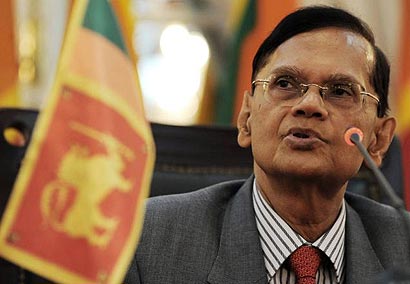Sri Lanka seeks allies’ support

Sri Lanka’s foreign minister left on Sunday on a two-week mission to shore up diplomatic support ahead of a U.N. Human Rights Council meeting, where the Indian Ocean nation is expecting to face a fight over Western-led pressure for a war crimes probe.
External Affairs Minister G.L. Peiris is scheduled to meet leaders from Singapore, Jordan, the Non-Aligned Movement and crucially, South Korea, the home country of U.N. Secretary General Ban Ki-Moon, a ministry statement said.
The minister’s visit comes ahead of crucial U.N. Human Rights Council sessions in Geneva this month, where Sri Lanka is expected to challenge Western nations that want the Indian Ocean nation to submit to an independent war crimes probe.
A report given to Ban by an advisory panel found there was “credible evidence” that Sri Lankan forces and the Liberation Tigers of Tamil Eelam (LTTE) committed war crimes and killed thousands of civilians in the war’s last months in 2009.
Peiris, after the bilateral meetings and a meeting of the Non-Aligned Movement’s foreign ministers, is due in Geneva, along with three other ministers and Sri Lanka’s ambassador to the U.N. in Geneva, who is Tamil.
Sri Lanka’s military crushed the Tamil Tigers to decisively end one of Asia’s longest-running modern wars in May 2009, but since the waning months of the conflict has been under increasing pressure over accusations of civilian deaths.
Rights groups, Western governments and well-funded pro-LTTE groups in the Tamil diaspora have made a coordinated push for Sri Lanka to submit to an external probe on what happened in the final stage of the war.
Sri Lanka says it was impossible to avoid all civilian casualties during the final offensive to wipe out the Tigers, who held nearly 300,000 people as human shields, but says its troops used only necessary and lawful force.
Colombo is counting on the diplomatic muscle of China and Russia, both of which are increasing post-war investment in Sri Lanka, to help it avoid a probe.
Both have U.N. Security Council vetoes and a general policy that sovereign nations should handle their internal conflicts without outside interference. President Mahinda Rajapaksa recently returned from a trip to China, where he was seeking economic support and backing against any war crimes investigation. (Reuters)
Courtesy: DM Online
Latest Headlines in Sri Lanka
- Sri Lanka allows women to work at night as sanitary and food service workers February 1, 2026
- India pledges INR 4 Billion aid to Sri Lanka in 2026-2027 Budget February 1, 2026
- Shiranthi Rajapaksa summoned to FCID on February 3, 2026 February 1, 2026
- Sri Lanka PM calls for education reform to strengthen nation February 1, 2026
- Sri Lanka revises fuel prices from February 1, 2026 January 31, 2026



UNHRC meeting should not be used to attack SL unfairly based on a highly biased Darusman Report, which was was produced without UN sanction, but as an ‘advisory report’ on the inititative of UNSG.
We need the support of China and Russia, with their veto powers, and the support of all the non-aligned allies, including India, to totally reject sustained efforts by the evil diaspora Tamils/LTTE through imperial West to win a resolution for so-called ‘war crimes’ probe and then attack SL, as they did Libya, to ‘arrest’ our political leaders and military leaders on trumped-up charges of war crimes. This is a gross injustice which cries to high heaven.
The imperial West were totally silent during 30 years of gross crimes against humanity and war crimes committed by the terrorist group LTTE, for vested interests.
USA and Britain has committed gross crimes against humanity and war crimes in their wars around the world since WW2. They continue to commit gross crimes against humanity and war crimes in their invasions of Afghanistan and Iraq where hundreds of thousands of innocent civilians were indiscriminately bombed to smithereens and tortured to death. USA continues to hold unlawfully thousands of suspects from Afghanistan and Iraq and other countries in their Guantanmo Bay military concentration camp. UNSG and UNHRC are completely silent about this, which is a gross injustice, as they are biased. Amnesty International has recently reported the massacre of 2700 civilians in Jammu & Kashmir by the Indian army and burial in a mass grave in 2009. No war crimes probe has been called by UNSG and the imperial West as they want to keep India on their side.
It is easy to hit SL as they did Libya. The non-aligned nations should now rise as one against the imperial West to denounce them for all their evils since the end of WW”.